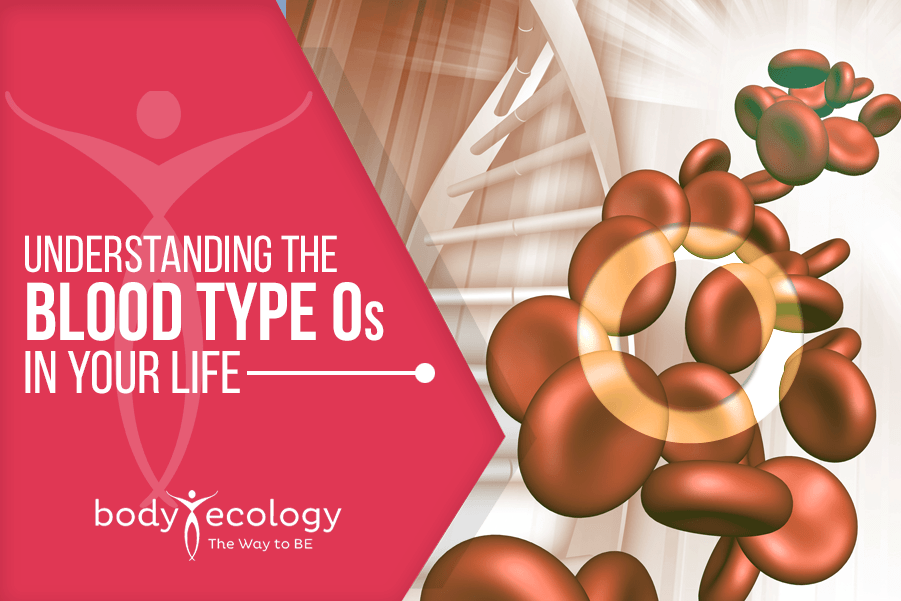
Body Ecology blood type series: Calling all Os
This last article in our blood type series is all about you Os. You are the most prevalent and the most easily distinguishable of all the blood types in the ABO blood group system for reasons that will soon become clear.
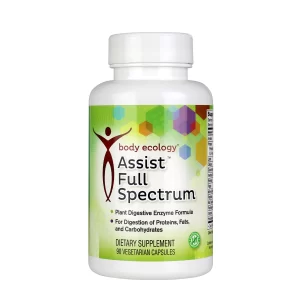
The type of antigen found on the surface of red blood cells (antigen A or B) is the factor that determines how a blood type will be classified.
Lacking an A or B antigen, you are classified as blood type O (positive or negative). When an O is also Rh-negative (more on this below), they can donate blood to any blood type and are therefore considered a “universal donor.”
Free download: Get the Body Ecology blood type ebook.
An antigen is a molecule that’s introduced to or is unknown to the body and may even be considered a toxin. It creates an immune response that leads to the production of antibodies (proteins that bind to foreign invaders in the body).
In our articles on blood type A, blood type B, and blood type AB*, we examined various components of these blood type profiles — their approach to exercise, what foods are recommended as best to eat, for what diseases or conditions might they uniquely be at risk, and what can be done to abate those risk factors.
These factors and more were the basis for the 1996 book (updated and revised in 2016) Eat Right for Your Type: 4 Blood Types, 4 Diets by Dr. Peter D ’Adamo, ND.1 When originally released, the book was met with a combination of praise and criticism and became the subject of many a research study in the years since its publication.
There’s not much in the medical literature confirming some of D ’Adamo’s assertions. That said, science has determined that blood type may play a role in the genesis of some disease states — and to a lesser degree, optimal exercise prescriptions and emotional strength.2 There doesn’t appear to be a high correlation between blood-type-specific diets and overall health as far as available research is concerned.
All about Os: Breaking down diet, exercise & personality
The development of the ABO blood group system has had a great impact on different branches of science throughout the world.3 With the advent of the blood group system, ABO blood type could be used by lawyers in paternity suits, for example.
Forensic scientists have also come to rely on the system in police science, while anthropologists began using the system to study various civilizations.
If a link between blood-type-based diets and general health cannot be made, multiple links have been established between blood groups that have a greater propensity for developing a given disease. For example, stomach ulcers have been found to be more common in blood group O, while stomach cancer is more common to blood group A.3
Those with blood type O also tend to have lower levels of a blood-clotting protein called the von Willebrand Factor (vWF). The von Willebrand Factor helps prevent bleeding following a vascular injury. With lower levels of this blood-clotting agent, Os have a greater risk of hemorrhaging if injured. The von Willebrand Factor is named after the Finnish scientist Erik Adolf von Willebrand, who is known for advancing the science of hematology.
As mentioned above:
- Blood types are classified by antigens.
- An antigen is a substance that activates an immune response by stimulating lymphocytes, the white blood cells that defend the body against disease.
- Each antigen reacts differently in terms of its immune response.
Antigens are on the surface of red blood cells. Red blood cells will contain antigen A or B. AB blood types have both antigens on red blood cell surfaces, while blood type O has no antigens. Therefore, blood type O is the “universal” blood donor — if they are also “Rh-negative.”
Rh, or Rhesus factor, classifies a blood type into “positive” or “negative” categories. If you’re an Rh-negative blood type, this means you don’t have an antigen — called antigen D — on the surface of your red blood cells. Blood classified as “negative” does not contain the Rhesus factor, just as blood type O does not contain an A or B antigen.
Blood type is inherited and passed down genetically from our parents. Detailed charts like this one allow someone to trace the origin of their blood type back to their parents for the purposes of understanding their risk of disease and other factors.
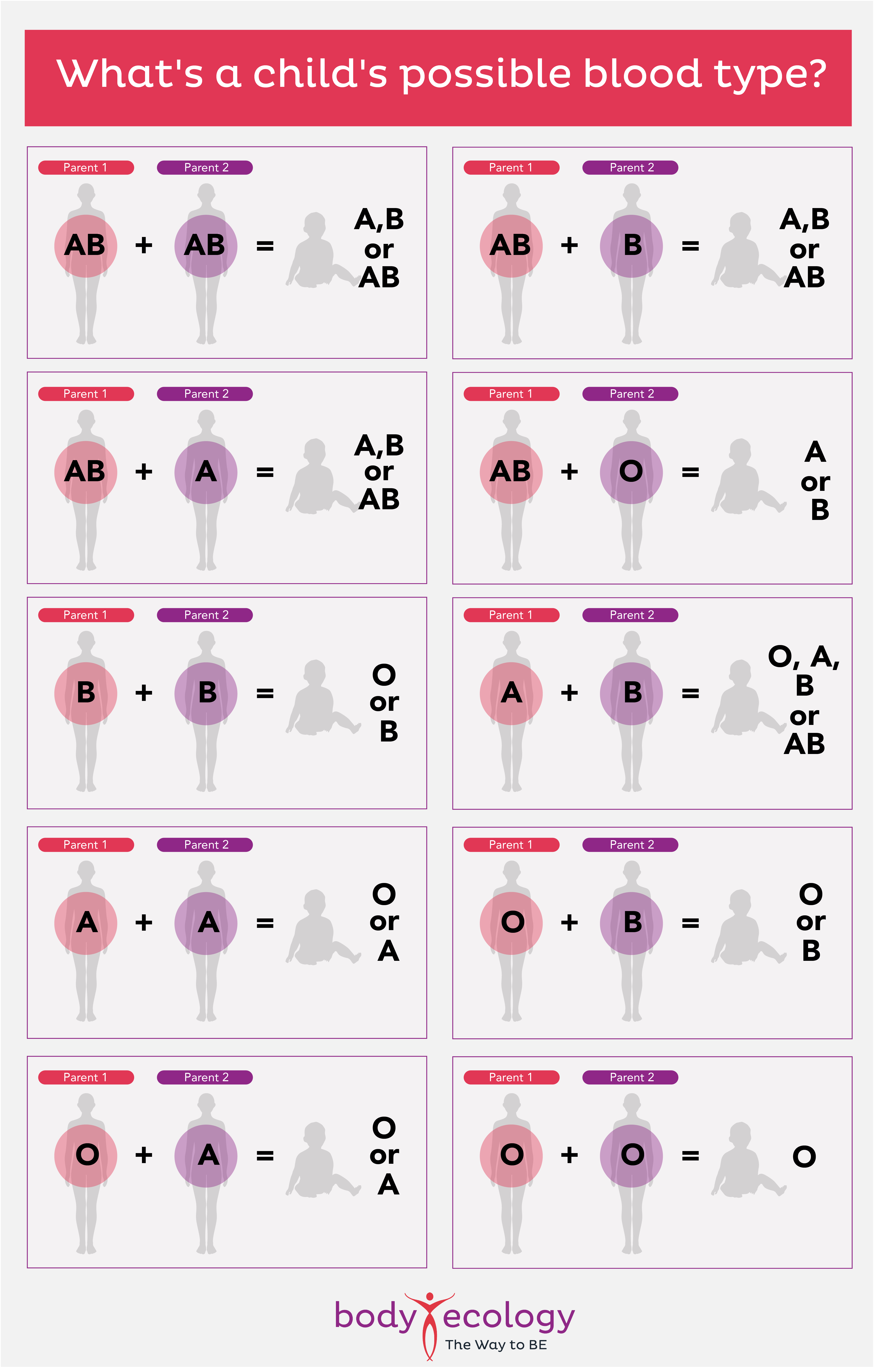
-
Blood type O personality.
According to Dr. D ‘Adamo, blood types evolved over time to ensure human adaptation and survival of the species.1 Blood group O is presumed to be the original blood type of all humans. However, more recent research shows there are several alterations that can neutralize either an A or B gene and “transform” them into O.4
Tracing the evolution of blood type groups can be difficult as there are multiple theories surrounding the progression of blood type science. The theories are all different, thus providing no definitive answer.
Scientists have determined that most likely, blood type A came first. Mutations to the original type A gene that followed then caused types B and O to appear. Scientists discovered this by employing a process called coalescence analysis.5 Coalescence analysis allows for the comparison of DNA that can determine when blood types were once the same.
Human beings tend to find ways to categorize each other. In 1930, Psychologist Tokeji Furukawa created a system that classified people based on personality characteristics he associated with their blood group.6
His research claimed each blood group type had specific attributes. He used questionnaires and provided detailed behavioral analysis to describe the traits of the various blood types, but ultimately, the scientific community found his theories to be lacking in empirical evidence.
His system still remains popular in Japan today, with the Japanese people overwhelmingly supporting Furukawa’s work.
According to Furukawa:
- Blood type Os tend to be bold, sociable self-starters.
- They set lofty goals and drive to achieve them.
- Type Os display leadership skills and don’t sweat the small stuff; these qualities can sometimes be interpreted as selfish to others, particularly type As.
Other positive characteristics include being self-assured, a positive thinker, relaxed, honest, extroverted, careful, trustworthy, and independent. Type Os can adapt well to new and/or difficult situations, perhaps more so than other blood types. The Japanese consider those with type O blood as the warriors of society due to their strong and durable nature.
Undesirable characteristics include being resentful, impolite, tardy, unsympathetic, distant, fickle, selfish, and egotistical.
-
Blood type O exercise.
The genetics of the Type O exerciser may most closely mimic Paleolithic man — if you believe cavemen/women actually lived their lives as hunter-gatherers. There is some doubt about whether Paleolithic man hunted and chased after game and developed strong physiques and cardiovascular systems in the process.
As it turns out, Paleolithic man may have hunted down his dinner, but depending on where he lived, he was just as likely to follow a vegetarian diet.7
Nevertheless:
- Type Os tend to be stronger and more athletic than their Type A, B, and AB counterparts, with sturdy arms and legs and well-developed cardiovascular systems.
- Type Os typically crave high-intensity workouts that include activities like HIIT training, running (more likely, sprinting), and explosive power elements like plyometrics.
Generally, Os use movement as a vehicle to manage emotional stress; they feel drawn to exercise more than any other blood type as a means to fight stress and anxiety and improve mood.
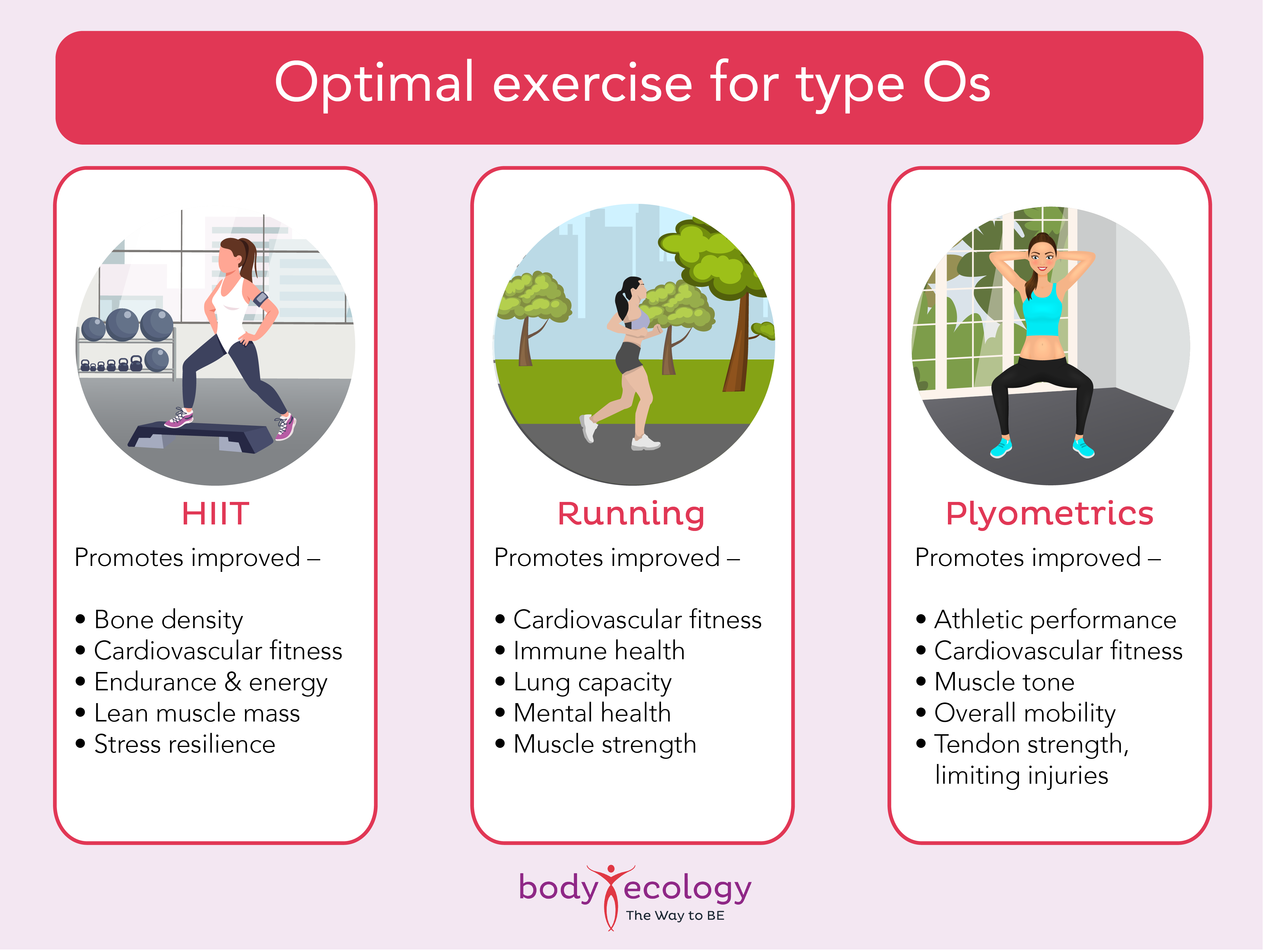
-
Blood type O diet.
As we discovered throughout this series, there is research available to support the tendency of some blood types to be at risk for specific diseases more than others:1
- Those with blood type O, for example, may have a lower risk for heart disease but a higher risk for developing stomach ulcers.3,8
- Type Os are also at higher risk for thyroid disorders, such as Hashimoto’s thyroiditis.9
- Seventy years ago, it was discovered that Type Os had about twice the incidence of ulcers of all kinds than the other blood types.10
People with type O blood may have a more intense reaction to stress — which takes the form of an overproduction of the hormone adrenaline.1 This may make it more difficult for Type Os to return to homeostasis following a bout of intense stress and may be why they prefer high-intensity exercise to manage this.
Taking blood type into consideration, Dr. D’Adamo declared individuals will react differently to specific foods due to the presence of lectins in those foods and how lectins can affect the blood.*
Lectins are sticky, carbohydrate-binding proteins in nearly all foods, but especially plant foods. Many are cooked out of food, but many are not. Lectins are so specific in their biochemical characteristics that they can even be distinguished among blood subgroups. They can impact body systems, such as digestion, joint health, immune function, and even metabolism.
But such proteins are not all “bad” — if you are a plant, that is. In the plant world, many lectins have insecticidal and antifungal properties, which help protect the plant from being eaten by insects.
Lectins are also in grains, particularly gluten-containing wheat products. With 20 million Americans suffering some degree of gluten sensitivity, this can be problematic; lectins may attach to intestinal cells, possibly causing inflammation and gut permeability, or leaky gut, instead of supporting the microbial environment as some lectins can do.
Fermentation is the ancient way that our ancestors preserved foods and ensured a healthy inner ecosystem. During fermentation, bacteria and yeast break down carbs (sugars and starches), producing acids that result in a distinctive sour taste.
These foods are your best bet to help dampen the inflammatory response and resulting leaky gut from lectin in your foods. So, be sure to include plenty of fermented foods and probiotic beverages in your diet.
The microbiomes of people can vary greatly among the blood types. Different types have different gut bacteria.11 Type Os, for instance, tend to have higher levels of stomach acid.1 They also tend to store carbs more easily than other blood groups — in the form of fat. Type Os then are particularly encouraged to supplement with probiotics to support a healthy and diverse microbiome.
Wondering what science has to say about eating fermented foods? This short video explains everything.
Blood type Os have a well-developed ability to digest meals that contain both protein and fat.1 This gives them the power to metabolize the cholesterol found in animal products more efficiently. However, the flip side of this is that on the blood type O diet, some carbohydrates, especially grains, can be easy to convert into fats and triglycerides and store as fat.
The best foods on the blood type O diet include:
- Lean meat: Beef, veal, lamb, most poultry (organic choices preferred). Avoid processed meats, i.e., bacon. Pork is also ideal to avoid.
- Seafood: Cod, trout, herring, tuna, and mackerel are all excellent sources of iodine. Iodine is important for thyroid health, which can be a concern for Type Os.
- Drinks: Os do well on many teas on the blood type O diet, including green tea, kukicha and bancha teas, ginger root tea, peppermint tea, and slippery elm tea. Blueberry juice, black cherry juice, prune juice, and pineapple juice are also beneficial. (These juices might give you some ideas of what to put into a morning smoothie.) Beer and liquor, white wine, coffee, cucumber juice, orange/tangerine juice, and Echinacea tea are better to avoid.
-
Fruit: Fruits like plums, figs, and prunes help regulate stomach acid; raspberries, gooseberries, and cranberries are ideal to eat only occasionally. Avoid oranges, blackberries, strawberries, kiwi, and melons.
- Vegetables: Sea vegetables are an excellent source of iodine for Os. Onion and garlic, artichoke, broccoli, collards, dandelion greens, escarole, romaine lettuce, kale, red pepper, parsnips, chili and jalapeno peppers, pumpkin, sweet potato, turnip greens, turnips, and ginger are some of your most highly beneficial vegetables. Avoid alfalfa sprouts, capers, cucumber, cauliflower, popcorn, shiitake mushrooms, black olives, leeks, rhubarb, pickles in vinegar, and white skin potatoes.
- Beans and legumes: Black beans, adzuki beans, and green (string) beans are all good choices to support thyroid health on the blood type O diet. Avoid soybeans, lentils, green peas, and peanuts (including peanut butter).
- Seeds: Pumpkin seeds, walnuts, and hemp and flax seeds are the most beneficial seeds and nuts to eat. Almonds, macadamia nuts, and pecans are “neutral” for an O. Best avoided are peanuts and peanut butter, cashews and cashew butter, pistachio nuts, and sunflower seeds and butter.
On the blood type O diet, D’Adamo says that most dairy products should be avoided. Exceptions include butter and mozzarella.
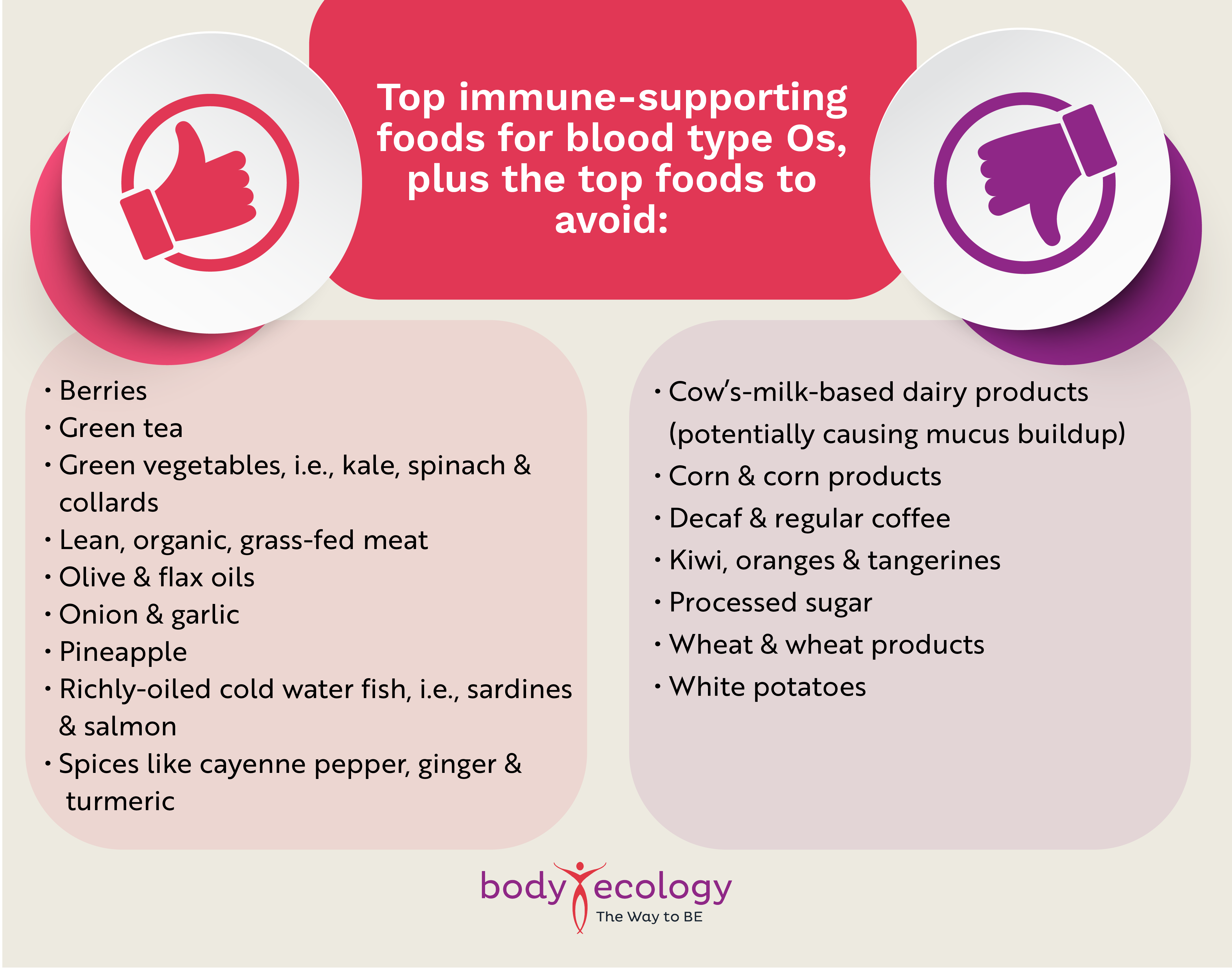
A few more fun facts about this fiery type
If you’re a coffee lover, you’ll be quite distraught to know that Dr. D ’Adamo recommends avoiding alcohol and caffeine on the blood type O diet. Caffeine can be especially problematic due to its propensity to raise adrenaline (naturally high for Os).
A 1999 study determined that adrenaline was increased throughout the day in subjects who started their day with four or five cups of coffee.12 So, one cup in the morning might be okay. Choose red wine over white wine and avoid beer and other alcoholic beverages.
Those with blood type O are also less susceptible to malaria. Type Os rarely die from malaria due to the RIFIN protein, the substance that causes malaria, being less able to bond to type O blood cells — rendering malaria less dangerous for Type Os.13
And finally, most of the Latinx-American population is type O+. About 53 percent of Latinx-Americans are O+, but only about 4 percent are O-.14
Free download: Get the Body Ecology blood type ebook.
REFERENCES:
- 1. DAdamo, Peter, and Catherine Whitney. Eat Right 4 Your Type (Revised and Updated): The Individualized Blood Type Diet® Solution. New American Library, 2016.
- 2. Ewald DR, Sumner SC. Blood type biochemistry and human disease. Wiley Interdiscip Rev Syst Biol Med. 2016;8(6):517-535. doi:10.1002/wsbm.1355.
- 3. Dean L. Blood Groups and Red Cell Antigens [Internet]. Bethesda (MD): National Center for Biotechnology Information (US); 2005. Chapter 5, The ABO blood group.
- 4. Shead, Sam. “Which human blood group evolved first?” BBC Science Focus Magazine, 2020.
- 5. Julia Sigwart, Coalescent Theory: An Introduction, Systematic Biology, Volume 58, Issue 1, February 2009, Pages 162–165, https://doi.org/10.1093/schbul/syp004.
- 6. Nuwer, Rachel. “You are what you bleed: In Japan and other east Asian countries some believe blood type dictates personality.” Scientific American, 2011.
- 7. Sayers, Ken, et al. “Blood, Bulbs, and Bunodonts: On Evolutionary Ecology and the Diets of Ardipithecus, Australopithecus, and Early Homo.” The Quarterly Review of Biology, vol. 89, no. 4, 2014, pp. 319–357. JSTOR, www.jstor.org/stable/10.1086/678568.
- 8. Meian He, Brian Wolpin, Kathy Rexrode, JoAnn E. Manson, Eric Rimm, Frank B. Hu, Lu Qi. ABO Blood Group and Risk of Coronary Heart Disease in Two Prospective Cohort Studies. Arteriosclerosis, Thrombosis and Vascular Biology, 2012 DOI: 10.1161/%u200BATVBAHA.112.248757.
- 9. Dağdeviren M, Ateş İ, Demir BF, Ergün E, Yıldız C, Altay M. Investigation of blood groups in benign thyroid diseases in Turkey. Endocr J. 2019 Nov 28;66(11):1001-1009. doi: 10.1507/endocrj.EJ18-0582. Epub 2019 Jul 12. PMID: 31308303.
- 10. Edgren G, Hjalgrim H, Rostgaard K, Norda R, Wikman A, Melbye M, Nyrén O. Risk of gastric cancer and peptic ulcers in relation to ABO blood type: a cohort study. Am J Epidemiol. 2010 Dec 1;172(11):1280-5. doi: 10.1093/aje/kwq299. Epub 2010 Oct 11. PMID: 20937632.
- 11. Mäkivuokko H, Lahtinen SJ, Wacklin P, et al. Association between the ABO blood group and the human intestinal microbiota composition. BMC Microbiol. 2012;12:94. Published 2012 Jun 6. doi:10.1186/1471-2180-12-94.
- 12. Lane, James. “Morning Coffee Boosts Blood Pressure, Stress Hormones All Day.” Duke University/Society of Behavioral Medicine, 1999.
- 13. Goel, S., Palmkvist, M., Moll, K. et al. RIFINs are adhesins in severe Plasmodium falciparum malaria. Nat Med 21, 314–317 (2015). https://doi.org/10.1038/nm.3812.
- 14. “Facts About Blood and Blood Types.” American Red Cross, 2021.








